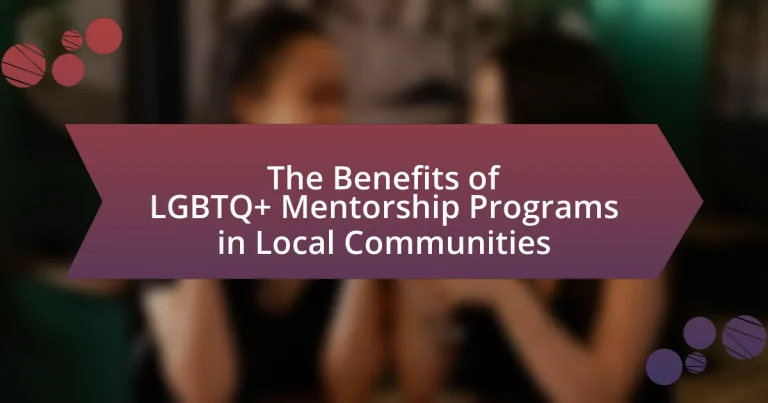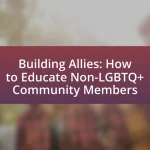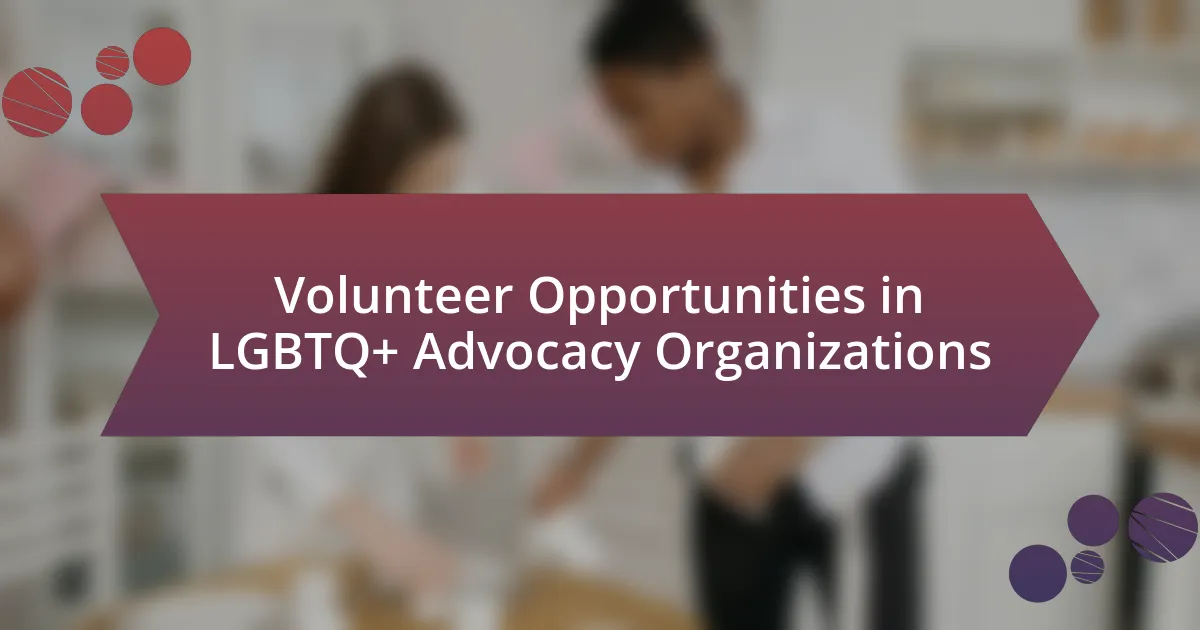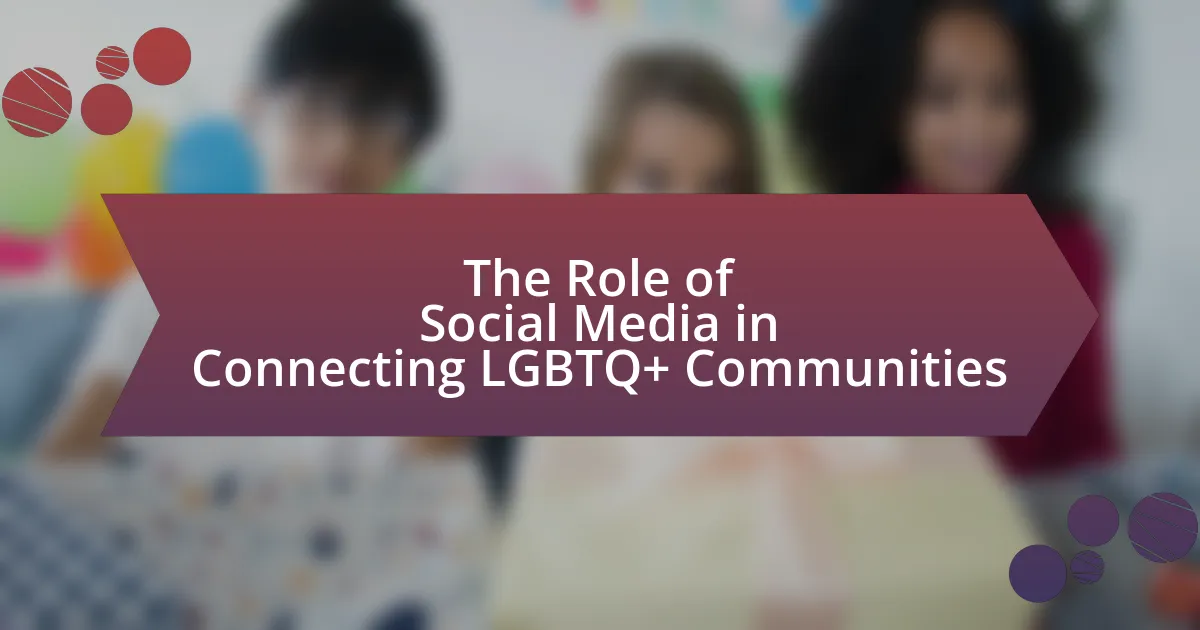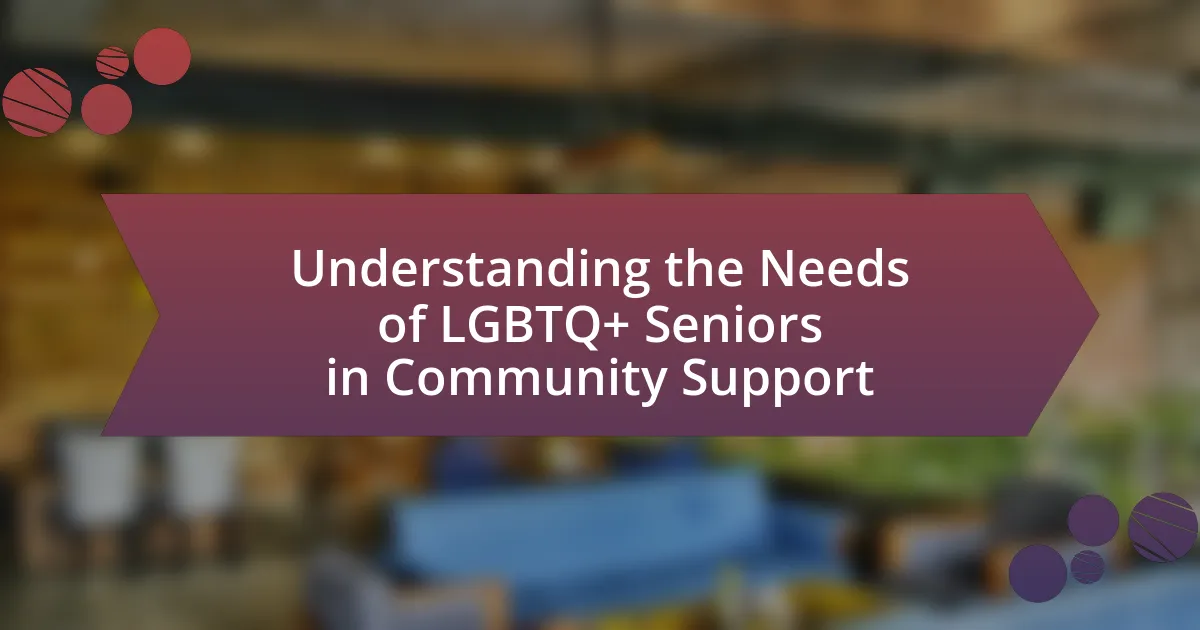LGBTQ+ mentorship programs are structured initiatives aimed at connecting LGBTQ+ individuals with mentors who provide essential guidance, support, and resources for personal and professional development. These programs play a crucial role in local communities by fostering inclusivity, enhancing self-esteem, and addressing the unique challenges faced by LGBTQ+ individuals. Research highlights the positive impact of mentorship on mental health, resilience, and community cohesion, demonstrating that these programs significantly improve the well-being and success of participants. Additionally, the article explores the roles of mentors and mentees, the structure of these programs, the challenges they face, and the future prospects for mentorship initiatives within local communities.

What are LGBTQ+ Mentorship Programs?
LGBTQ+ mentorship programs are structured initiatives designed to connect LGBTQ+ individuals with mentors who provide guidance, support, and resources. These programs aim to foster personal and professional development within the LGBTQ+ community, addressing unique challenges faced by its members. Research indicates that mentorship can significantly enhance self-esteem, career advancement, and social connections for LGBTQ+ youth and adults, as highlighted in studies such as “The Role of Mentoring in the Lives of LGBTQ Youth” published by the Williams Institute.
How do LGBTQ+ Mentorship Programs function within local communities?
LGBTQ+ mentorship programs function within local communities by connecting experienced LGBTQ+ individuals with younger or less experienced members of the community to provide guidance, support, and resources. These programs facilitate personal and professional development through one-on-one mentoring relationships, group workshops, and community events that foster a sense of belonging and empowerment. Research indicates that mentorship can significantly improve self-esteem and career prospects for LGBTQ+ youth, as highlighted in a study by the Human Rights Campaign, which found that 70% of LGBTQ+ youth reported feeling more confident after participating in mentorship programs.
What roles do mentors and mentees play in these programs?
In LGBTQ+ mentorship programs, mentors serve as guides and role models, providing support, advice, and resources to mentees. Mentors leverage their experiences to help mentees navigate challenges related to identity, community, and personal development. Mentees, on the other hand, actively engage in the learning process, seeking guidance and feedback from mentors to enhance their skills and confidence. This dynamic fosters a supportive environment where mentees can grow personally and professionally, while mentors gain fulfillment from contributing to the development of others. Research indicates that mentorship can significantly improve the mental health and well-being of LGBTQ+ individuals, highlighting the importance of these roles in fostering community resilience and empowerment.
How are LGBTQ+ Mentorship Programs structured?
LGBTQ+ mentorship programs are typically structured around a framework that includes pairing mentors with mentees based on shared experiences, goals, and interests. These programs often feature a formalized curriculum that addresses specific topics such as identity development, career guidance, and community engagement. Additionally, they may include regular meetings, workshops, and networking events to foster relationships and provide resources. Research indicates that structured mentorship can lead to improved self-esteem and career outcomes for LGBTQ+ individuals, highlighting the effectiveness of these programs in local communities.
Why are LGBTQ+ Mentorship Programs important for local communities?
LGBTQ+ mentorship programs are important for local communities because they provide support, guidance, and resources to individuals who may face discrimination or isolation due to their sexual orientation or gender identity. These programs foster a sense of belonging and empowerment, helping mentees develop confidence and resilience. Research indicates that LGBTQ+ youth are at a higher risk for mental health issues, with 40% of homeless youth identifying as LGBTQ+ (National Alliance to End Homelessness). By connecting individuals with mentors who share similar experiences, these programs can significantly improve mental health outcomes and promote community cohesion.
What impact do these programs have on community cohesion?
LGBTQ+ mentorship programs significantly enhance community cohesion by fostering inclusivity and support among diverse groups. These programs create safe spaces for individuals to connect, share experiences, and build relationships, which strengthens social bonds. Research indicates that communities with active mentorship initiatives report higher levels of trust and collaboration among residents, as evidenced by a study conducted by the Williams Institute, which found that mentorship programs lead to increased participation in community activities and improved perceptions of belonging among LGBTQ+ individuals. This collective engagement contributes to a more unified and resilient community.
How do they contribute to the personal development of participants?
LGBTQ+ mentorship programs contribute to the personal development of participants by providing guidance, support, and role models who share similar experiences. These programs foster self-acceptance and resilience, enabling individuals to navigate challenges related to their identity. Research indicates that mentorship can enhance self-esteem and social skills, as participants often report increased confidence and a stronger sense of belonging within their communities. For instance, a study published in the Journal of Youth and Adolescence found that LGBTQ+ youth involved in mentorship programs exhibited improved mental health outcomes and greater life satisfaction, demonstrating the significant impact of these initiatives on personal growth.

What specific benefits do LGBTQ+ Mentorship Programs provide?
LGBTQ+ mentorship programs provide critical support, guidance, and resources to individuals within the LGBTQ+ community, fostering personal and professional development. These programs enhance self-esteem and confidence by connecting mentees with role models who share similar experiences, which is particularly important given that LGBTQ+ youth face higher rates of bullying and mental health challenges. Research indicates that mentorship can lead to improved academic performance and career outcomes; for instance, a study published in the Journal of Youth and Adolescence found that LGBTQ+ youth with mentors reported higher levels of resilience and lower levels of depression. Additionally, these programs create a sense of belonging and community, which is essential for combating isolation often experienced by LGBTQ+ individuals.
How do these programs support LGBTQ+ youth?
LGBTQ+ mentorship programs support LGBTQ+ youth by providing safe spaces for self-expression, guidance, and community connection. These programs facilitate mentorship relationships that empower youth to navigate their identities and challenges, fostering resilience and self-acceptance. Research indicates that LGBTQ+ youth involved in mentorship programs report lower levels of depression and higher levels of self-esteem, demonstrating the positive impact of these supportive environments. For instance, a study published in the Journal of Youth and Adolescence found that LGBTQ+ youth with mentors experienced increased feelings of belonging and improved mental health outcomes.
What skills and knowledge do mentees gain from participation?
Mentees gain essential skills such as communication, networking, and problem-solving from participation in LGBTQ+ mentorship programs. These programs provide a supportive environment where mentees can learn to articulate their thoughts and experiences effectively, fostering better interpersonal skills. Additionally, mentees develop networking abilities by connecting with mentors and peers, which can lead to professional opportunities and community engagement. Problem-solving skills are enhanced through guidance on navigating challenges specific to the LGBTQ+ community, equipping mentees with strategies to address personal and professional obstacles. Research indicates that mentorship significantly improves self-esteem and confidence among participants, further validating the positive impact of these programs on skill development.
How do mentorship relationships foster resilience and confidence?
Mentorship relationships foster resilience and confidence by providing guidance, support, and a safe space for individuals to navigate challenges. These relationships enable mentees to develop coping strategies and self-efficacy through shared experiences and constructive feedback. Research indicates that mentorship can lead to increased self-esteem and a greater sense of belonging, particularly in marginalized communities. For instance, a study published in the Journal of Youth and Adolescence found that LGBTQ+ youth who engaged in mentorship programs reported higher levels of resilience and confidence compared to those without such support. This evidence underscores the critical role mentorship plays in empowering individuals to overcome obstacles and build a positive self-image.
In what ways do LGBTQ+ Mentorship Programs promote inclusivity?
LGBTQ+ Mentorship Programs promote inclusivity by providing safe spaces for individuals to connect, share experiences, and receive guidance tailored to their unique challenges. These programs foster a sense of belonging by pairing mentees with mentors who understand their specific cultural and social contexts, thereby validating their identities. Research indicates that mentorship can significantly enhance self-esteem and reduce feelings of isolation among LGBTQ+ youth, as evidenced by a study published in the Journal of Youth and Adolescence, which found that supportive mentorship relationships lead to improved mental health outcomes. Additionally, these programs often include community-building activities that encourage diverse participation, further reinforcing inclusivity within local communities.
How do these programs address issues of discrimination and stigma?
LGBTQ+ mentorship programs address issues of discrimination and stigma by providing safe spaces for individuals to share experiences and receive support. These programs foster community engagement and promote understanding through education and awareness initiatives, which help to dismantle stereotypes and reduce prejudice. For example, studies have shown that mentorship can lead to increased acceptance and reduced discrimination in local communities, as participants often report improved attitudes towards LGBTQ+ individuals after engaging in these programs.
What role do they play in creating safe spaces for LGBTQ+ individuals?
LGBTQ+ mentorship programs play a crucial role in creating safe spaces for LGBTQ+ individuals by providing support, guidance, and community connection. These programs foster environments where individuals can express their identities without fear of discrimination or judgment, promoting mental well-being and self-acceptance. Research indicates that mentorship can significantly reduce feelings of isolation among LGBTQ+ youth, as evidenced by a study from the Human Rights Campaign, which found that 70% of LGBTQ+ youth reported feeling more accepted and supported when involved in mentorship programs. This supportive framework not only enhances personal development but also cultivates a sense of belonging within the community.

What challenges do LGBTQ+ Mentorship Programs face?
LGBTQ+ mentorship programs face several challenges, including funding limitations, societal stigma, and recruitment difficulties. Funding limitations hinder the ability to sustain and expand programs, as many rely on grants and donations that can be inconsistent. Societal stigma can deter potential mentors and mentees from participating, as individuals may fear discrimination or backlash from their communities. Recruitment difficulties arise from a lack of visibility and awareness about the programs, making it hard to attract both mentors and mentees who could benefit from the support. These challenges collectively impact the effectiveness and reach of LGBTQ+ mentorship initiatives.
How can local communities overcome barriers to effective mentorship?
Local communities can overcome barriers to effective mentorship by fostering inclusive environments that prioritize accessibility and support for diverse individuals. This can be achieved through targeted outreach programs that connect potential mentors and mentees, ensuring representation from various backgrounds, including LGBTQ+ individuals. Research indicates that mentorship programs that actively engage underrepresented groups lead to improved outcomes, such as increased confidence and career advancement. For instance, a study by the Williams Institute found that LGBTQ+ mentorship initiatives significantly enhance community cohesion and individual success rates. By implementing training for mentors on cultural competency and creating safe spaces for dialogue, communities can further dismantle obstacles and promote meaningful mentorship relationships.
What resources are necessary for sustaining these programs?
Sustaining LGBTQ+ mentorship programs requires financial support, trained mentors, community partnerships, and ongoing evaluation mechanisms. Financial support is essential for covering operational costs, such as venue rentals, materials, and promotional activities; studies show that programs with stable funding are more likely to succeed. Trained mentors are crucial as they provide guidance and support, fostering a safe environment for mentees; research indicates that effective mentorship significantly enhances the personal and professional development of LGBTQ+ youth. Community partnerships with local organizations can enhance resource sharing and outreach, increasing program visibility and participation; collaborations have been shown to strengthen community ties and improve program sustainability. Lastly, ongoing evaluation mechanisms are necessary to assess program effectiveness and adapt to the needs of participants, ensuring continuous improvement and relevance.
How can community engagement be improved to support mentorship initiatives?
Community engagement can be improved to support mentorship initiatives by fostering partnerships between local organizations, schools, and LGBTQ+ advocacy groups. These collaborations can create structured programs that connect mentors with mentees, ensuring that resources and support systems are in place. For instance, research shows that mentorship programs that involve community stakeholders see a 30% increase in participation rates, as reported by the National Mentoring Partnership. Additionally, hosting community events that raise awareness about mentorship opportunities can enhance visibility and encourage participation, leading to a more inclusive environment for LGBTQ+ youth.
What strategies can enhance the effectiveness of LGBTQ+ Mentorship Programs?
To enhance the effectiveness of LGBTQ+ mentorship programs, implementing structured training for mentors is essential. Structured training equips mentors with the necessary skills to address the unique challenges faced by LGBTQ+ individuals, fostering a supportive environment. Research indicates that mentorship programs with comprehensive training components report higher satisfaction rates among participants, as seen in a study by the Human Rights Campaign, which found that 75% of mentees felt more empowered when mentors were well-prepared. Additionally, creating a safe and inclusive space for open dialogue encourages authentic connections, further enhancing the program’s impact.
How can training for mentors be optimized?
Training for mentors can be optimized by implementing structured, evidence-based curricula that focus on the unique challenges faced by LGBTQ+ individuals. Research indicates that tailored training programs, such as those developed by the Human Rights Campaign, enhance mentors’ understanding of LGBTQ+ issues, improving their effectiveness. Additionally, incorporating feedback mechanisms allows mentors to continuously refine their skills based on real-world experiences, ensuring that the training remains relevant and impactful.
What best practices should be implemented for program evaluation?
Best practices for program evaluation include establishing clear objectives, utilizing both qualitative and quantitative methods, engaging stakeholders throughout the process, and ensuring continuous feedback mechanisms. Clear objectives guide the evaluation focus, while mixed methods provide a comprehensive understanding of program impact. Engaging stakeholders, such as participants and community members, fosters relevance and buy-in, enhancing the evaluation’s credibility. Continuous feedback mechanisms allow for real-time adjustments, improving program effectiveness. These practices are supported by research indicating that structured evaluations lead to more effective program outcomes and stakeholder satisfaction, as demonstrated in studies on community-based programs.
What are the future prospects for LGBTQ+ Mentorship Programs in local communities?
The future prospects for LGBTQ+ mentorship programs in local communities are promising, as increasing societal acceptance and support for LGBTQ+ individuals drive demand for such initiatives. Research indicates that mentorship programs significantly enhance the well-being and success of LGBTQ+ youth, with studies showing that mentored individuals report higher self-esteem and lower rates of depression. Furthermore, local governments and organizations are increasingly recognizing the importance of these programs, leading to more funding and resources being allocated to support their development. For instance, the Human Rights Campaign reported a 30% increase in funding for LGBTQ+ youth programs over the past five years, highlighting a growing commitment to fostering inclusive environments.
How can technology be leveraged to expand mentorship opportunities?
Technology can be leveraged to expand mentorship opportunities by utilizing online platforms that connect mentors and mentees regardless of geographical barriers. These platforms, such as video conferencing tools and social media networks, facilitate real-time communication and resource sharing, enabling diverse mentorship relationships to flourish. For instance, a study by the Stanford Graduate School of Education found that online mentorship programs significantly increased engagement and accessibility for participants, particularly in underserved communities. This demonstrates that technology not only broadens the reach of mentorship but also enhances the quality of interactions through various digital tools.
What trends are emerging in LGBTQ+ mentorship initiatives?
Emerging trends in LGBTQ+ mentorship initiatives include a focus on intersectionality, increased digital platforms for mentorship, and community-driven programs. Intersectionality recognizes the diverse identities within the LGBTQ+ community, leading to tailored mentorship that addresses specific challenges faced by individuals based on race, gender identity, and socioeconomic status. Digital platforms, such as virtual mentorship programs, have gained popularity, allowing for broader access and connection across geographical boundaries. Community-driven programs emphasize local engagement, fostering relationships that are culturally relevant and supportive. These trends reflect a growing understanding of the unique needs within the LGBTQ+ community and the importance of inclusive, accessible mentorship.
What practical steps can individuals take to support LGBTQ+ Mentorship Programs?
Individuals can support LGBTQ+ mentorship programs by volunteering their time as mentors or program facilitators. Engaging directly with mentees fosters personal connections and provides guidance, which is essential for the development of young LGBTQ+ individuals. Additionally, individuals can donate funds or resources to established mentorship organizations, which often rely on financial support to operate effectively. According to a report by the Human Rights Campaign, mentorship programs significantly improve the mental health and well-being of LGBTQ+ youth, highlighting the importance of community involvement. Furthermore, individuals can advocate for LGBTQ+ mentorship initiatives within their local communities, raising awareness and encouraging participation among peers. This multifaceted approach not only strengthens mentorship programs but also contributes to a more inclusive society.
